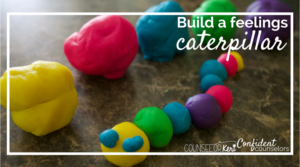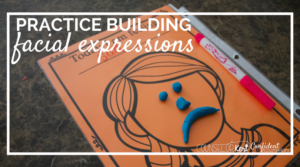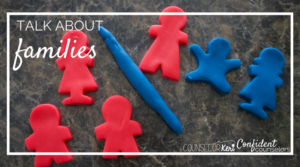Students light up the moment Play Doh appears in any school setting, and school counseling is no exception. Play Doh is not only a great sensory tool that puts students at ease when discussion potentially difficult topics, but it is the perfect creative outlet to engage students in individual and small group counseling to explore feelings, family changes, and more! Read below to explore 5 ways you can use Play Doh in school counseling.
5 Ways to Use Play Doh in School Counseling
Build a Feelings Caterpillar

This activity is a simple but fun way to engage students in an individual or small group setting. Use this activity to get to know your students or explore differences among group members. All you’ll need is a variety of Play Doh colors and your question set. Place your Play Doh balls in the center of the table within reach of all students. Explain that each color represents a different feeling, and label the colors with note cards (i.e. red Play Doh represents anger, blue Play Doh represents sadness, etc.).
Begin by reading a scenario (ex: Someone laughed at me when I got a question wrong). Instruct students to choose the color that represents how they would feel in the stated scenario. Students will pinch a small piece of Play Doh and roll it into a ball to create a segment of the caterpillar. Give students a chance to share why they chose that color. Read another scenario, and instruct students to do the same by adding the next ball to create caterpillar segments.
After you have read all of the scenarios, talk about the similarities and differences in each group member’s caterpillar. Talk about how in the same situation, different people might experience different feelings!
Practice Building Facial Expressions

Feeling mats have many uses in school counseling. Laminate them (or use page protectors) for easy reuse with Play Doh, and you’re ready to explore feelings! Give students feeling mats and Play Doh to create facial expressions that represent how they’re feeling right now or how they feel in given situations. These are a great tool for check-in/check-out or for I-statement practice.
Smash to Release Anger

Play Doh is also a great tool for teaching appropriate release of anger. Give your student a ball of Play Doh and model how to smash it with your fist and then knead it in your hands. Remind students that it is perfectly okay to feel anger! Smashing Play Doh, rather than other inappropriate objects, is a great way to release tension and then continue to engage the senses to calm down afterward.
Talk About Families

Use Play Doh and people cookie cutters to explore families. Have your students cut out the people who are in their families and arrange the people in a way that makes sense to them. Ask your students to explain the positions of the family members, colors they chose to use, and other variables as a way to explore family dynamics and the students’ feelings about changes that may be occurring in the family. If you don’t have people cookie cutters, simply have students build their family members with Play Doh! This will also give you a greater opportunity to explore the sizes of family members, features included/excluded, and more.
Create a Mandala

For a creative activity that can be as simple or as complex as you wish, have your students create a Play Doh mandala. Mandala is a Sanskrit word meaning circle that represents wholeness. Mandalas have a center focus point with symmetry around the center and are becoming a more commonly used tool for emotional processing, calming, insight, and confidence.
Provide students with Play Doh and a variety of beads, seeds, gems, rocks, etc. to create a circular design. Give students lots of freedom to create a design that is meaningful to them! You can also lead students through a mindfulness activity using their mandalas. Instruct students to focus on the whole mandala, noticing how it looks and how they feel while looking at it. Then instruct students to move their focus inward to the center. Engage senses by having students touch the items they used to create the mandala and focus on the feeling of each of the items. For take-home mandalas, dry out the Play Doh for a few days or bake it on parchment paper at a low temperature.
Engaging students’ senses and with Play Doh can provide a sense of comfort and safety as students broach difficult topics and feelings within the school counseling setting. How do you encourage your students to share and express themselves with Play Doh in school counseling? Let us know in the comments! We love hearing from you!
For more ways to ingrate everyday supplies into your school counseling program, check out these posts on using coffee filters, paper bags, rocks, tissue boxes, and toilet paper tubes in school counseling!






I love the feelings caterpillar. I can’t wait to try that out with one of my kids. Thank you for the fun idea! 🙂
Thanks so much, Mental Fills! It’s fun to see how everyone’s caterpillar ends up looking a little different 🙂